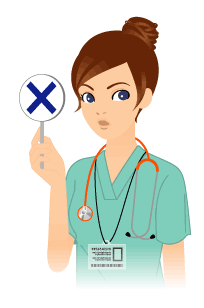Preparing For Your Anaesthetic
Pre-existing medical conditions
Pre-existing medical conditions should be under good control prior to a planned medical or surgical procedure. A few common conditions are high blood pressure, asthma and diabetes.
Smoking
Smoking is harmful to your health and it can cause cancer and chronic lung and heart conditions. it is also bad in the short term around the time of operations. Quitting a few weeks prior to your anaesthetic will allow your lungs to recover and help your breathing during your operation. It will also increase the levels of oxygen in your blood and improve wound healing.
Teeth
If you have loose teeth you are advised to see your dentist prior to your anaesthetic.
Food & Drink Restriction
Please follow these guidelines carefully prior to a general or regional (spinal/epidural) anaesthetic. For local anaesthetic procedures - where an anaesthesiologist is not involved - it is not usually necessary to starve preoperatively but you are advised to consult your surgeon. Food and fluids are restricted to reduce the risk of aspiration by reducing the contents of your stomach. Aspiration occurs when an object or liquid is inhaled into the respiratory tract when a person regurgitates contents into the throat. Aspiration during anesthesia in an adequately fasted patient is uncommon, but if it occurs it can cause severe complications.
adequately fasted patient is uncommon, but if it occurs it can cause severe complications.
- Do not eat for a minimum of 6 hours before your surgery
- Clear fluids may be given up to 2 hours before your surgery
Children over 1 year
- No food or milk for 6 hours prior to surgery
- Clear fluids may be given up to 2 hours before surgery
Babies under 1 year on regular milk feeds
- No formula milk feeds for 6 hours prior to surgery
- No breast milk for 4 hours prior to surgery
- Clear fluids may be given up to 2 hours before surgery
"Clear fluids" means only the following: plain water, black tea or coffee. The following are not permitted: milk in tea or coffee, fruit juices, alcohol, chewing gum and sweets.
Your Usual Medications
If you take any medicines on a regular basis, such as diabetes medicines or heart medicines, ask your surgeon whether you should take your medicines on the day before or the day of your surgery. Some of the commonly used drugs are summarized in our "Perioperative Management of Chronic Medications". Drug can be taken with a sip of water within 6 hours before your surgery.
Herbal & Alternative Therapy
The actual ingredients of many herbal and alternative therapies are uncertain and in some circumstances will interact with anaesthesia. We would advise that all herbal and alternative medications are stopped at least one week prior to surgery.
Serious Anaesthetic Reaction
Very rarely, due to genetic factors, there can be a potentially fatal reaction to anaesthesia. If you or any blood relative has previously had a severe reaction to an anaesthetic please alert your surgeon and anaesthesiologist.
Medicine given before anesthesia
You may be given a medicine before anesthesia. Medicines may be given by mouth or by injection immediately before anesthesia. An example is oral medication to reduce the acidity of gastric fluid so that chemical injury to the lungs is reduced in the event of gastric aspiration during anaesthesia.
Anesthetic Informed Consent
Your anaesthesiologist will discuss your anesthesia care with you so that you will understand what is involved, and you can then give your informed consent. You will be able to ask questions and express any concerns. In the meantime please take time to read through the anaesthesia related information provided in our website.